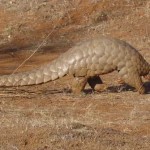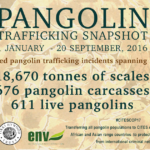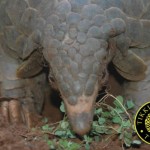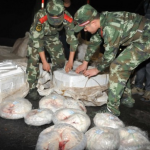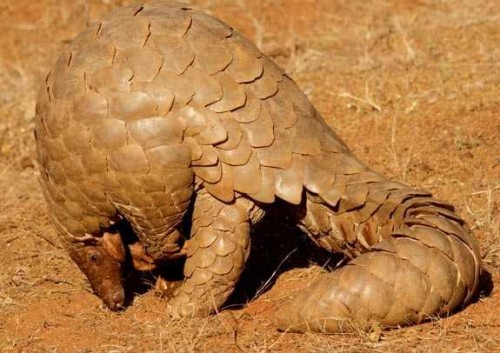
Pakistan customs officials have seized 145kg of pangolin scales at Benazir Bhutto International Airport, Islamabad, from two Chinese nationals.
The pair was identified as Lou Ruiyuan (passport E112653H) and Ying Fulan (passport E04400002), according to Pakistan’s Business Recorder. They were reportedly en route to Hong Kong via Thai Airways flight TG-350. However, it appears these two would-be traffickers avoided penalties and were “allowed to proceed abroad after fulfilling formalities”.
“The recovered pangolin scales have been seized for violation of the provisions of section 16 and 139 of the Customs Act, 1969 read with S No 1 of Schedule-I of Export Policy Order, 2013.”
On paper, pangolins are protected under the Islamabad Wildlife (Protection, Preservation, Conservation, and Management) Ordinance of 1979 and the North-West Frontier Province Wildlife (Protection, Preservation, Conservation, and Management) Act of 1975.
Despite the lack of public awareness and resources, wildlife officials in Pakistan are working to protect imperiled species, such as pangolins. Niaz Ahmad from the Wildlife Department of Khyber Pakhtunkhwa (KP) recently told the Pakistan Observer that his team had arrested several people for hunting pangolins. He asks that the public report any pangolin poaching incidents to the DFO Wildlife Extension.
Unfortunately, the recent incident in Islamabad, which occurred on March 31, 2014, is not an isolated one — and likely represents just a fraction of the actual illicit activity.
- Investigations in mainland China revealed that more than one ton of pangolin scales were trafficked into the country from Pakistan during 2013. Incredibly, most of these scales were sent from Pakistan to China via parcel post.
- Pakistani researchers documented the killing of at least 118 pangolins for the illegal trade between January 2011 and May 2012 in their report, Illegal Mass Killing of Indian Pangolin in Potohar Region, Pakistan (download it here). They cite an incident from April 2012, in which a suspect was arrested in China with 25.4 kg of pangolin scales, who says he acquired the scales while working in Pakistan.
Efforts to “mainstream” wildlife crime in Pakistan would likely have the support of Justice Syed Mansoor Ali Shah of the Lahore High Court, who says that the penalties for wildlife crime are “currently insufficient”. At the Symposium on Combating Wildlife Crime side event at the CITES CoP16 meeting in Bangkok, Justice Shah said he is very interested in innovative concepts, such as rewarding “whistleblowers” and blacklisting companies which are involved with wildlife crime (excellent ideas, in my opinion).
The pangolin species which inhabits Pakistan is the Indian or thick-tailed pangolin (Manis crassicaudata). It is also native to Bangladesh, India, and Sri Lanka. Like all pangolin species, the Indian pangolin population is declining.
The Pakistani research team (Tariq Mahmood, Riaz Hussain, Nausheen Irshad, Faraz Akrim, and Muhammad Sajid Nadeem) who authored the above-referenced paper, Illegal Mass Killing of Indian Pangolin in Potohar Region, Pakistan, recommend uplisting the Indian pangolin’s status from “Near Threatened” to “Endangered”, and transferring the species from CITES Appendix II to Appendix I.

